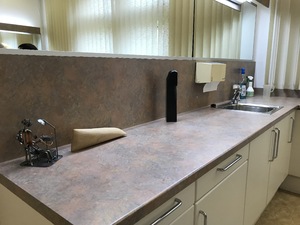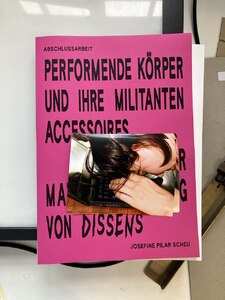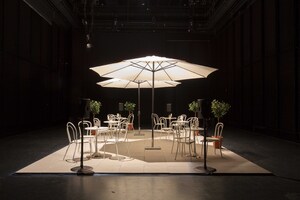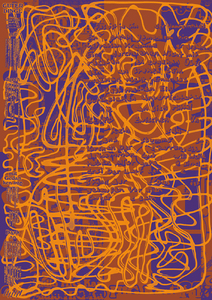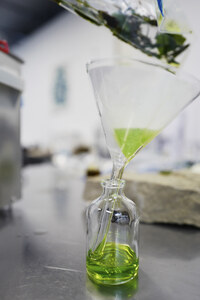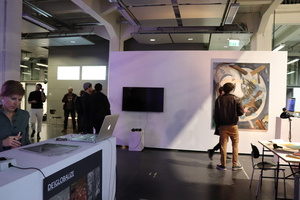Hanna Jurisch
| Name | Hanna Jurisch |
6 Inhalte
- Seite 1 von 1
Kunst in der Praxis
- Titel
- Kunst in der Praxis
- Untertitel
- Methoden des Ausstellens im Vergleich zwischen ärztlicher Praxis und Kunstmuseum
- Autor/in
- Beschreibung (de)
- In ärztlichen Praxen sind häufig künstlerische Objekte ausgestellt. Anders als im Museum ist die Begegnung mit diesen Objekten jedoch eher selten der Anlass für den Besuch der medizinischen Einrichtung. Die beiläufige Betrachtung der Kunstwerke ist vielmehr ein ästhetisches Nebenprodukt des eigentlichen Anliegens der Besucher*innen. Wie und warum werden überhaupt Kunstobjekte in ärztlichen Einrichtungen präsentiert? Lässt sich diese Präsentation mit musealen Ausstellungen vergleichen? Diesen Fragen wird in dieser Magisterarbeit nachgegangen und mittels Feldforschung und museumskritischer Einordnung begegnet.
- Kategorie
- Typ des Projekts/Werks
- Schlagworte
- Datierung
- 21.10.2021
- Dank an
- Sprache
- Abmessungen
- 123 Seiten (85 Seiten Text)
- Stadt
- Land
- Titel
- Kunst in der Praxis
- Projektleiter/in
- Semester
- Studiengang
- Typ der Abschlussarbeit
- Importiert am
- 13.10.2025
- Übergeordnete Sets
- 2
- Set enthält
- 0 6
Performende Körper und ihre militanten Accessoires
- Titel
- Performende Körper und ihre militanten Accessoires
- Untertitel
- Zur Materialisierung von Dissens
- Autor/in
- Beschreibung (de)
- Ausgehend von der Annahme, dass Protest nicht nur durch Sprache oder Körper, sondern vor allem durch Gegenstände artikuliert wird, richtet die Magistraarbeit den Fokus auf die materiell-symbolischen Politiken feministischer Protestperformances. Dafür schlage ich das Konzept des "militanten Accessoires" als Analysekategorie für feministische Performancepraktiken vor. Das Accessoire, das oft mit weiblich* gelesenen Körpern assoziiert ist, wird als scheinbar harmloses, alltägliches und schmückendes Modeelement in einen handlungsorientierten, widerständigen Gegenstand umgedeutet und neu kontextualisiert. Anhand von zwei aktivistisch-performativen Aktionen der Women’s Social and Political Union (Window Smashing Campaign, 1912 ) und Pussy Riot (Punk Prayer, 2012) werden zwei Gegenstände, ein 19cm großer Toffeehammer sowie eine neonbunte Sturmhaube, als "militante Accessoires" identifiziert. In ihrem wechselwirkenden Verhältnis mit Körpern ermöglicht das "militante Accessoire" diesen, politische und emanzipatorische Potenziale zu entfalten und Orte in Räume des Protests zu transformieren.
Dieser Analyse folgend übertrage ich die Bedingungen des "militanten Accessoires" im letzten Kapitel auf künstlerische Protestperformances. Dabei betrachte ich unter anderem künstlerische Produktionen von Selma Selman (You Have No Idea), Pipilotti Rist (Ever Is Over All) und Milica Tomić (One Day, Instead of One Night, a Burst of Machine-Gun Fire Will Flash, if Light Cannot Come Otherwise) und frage, inwiefern "militante Accessoires" nicht nur in kollektiven Protestperformances, sondern auch für einzelne Körper in feministischen, künstlerischen Performances eine Möglichkeit des Ausdrucks von Protest bieten.
Die Magistraarbeit rückt die kompliz*innenhafte Beziehung zwischen Kunst und Protest in den Fokus und zeigt, dass "militante Accessoires" nicht nur symbolische Bedeutungsträger*innen sind, sondern in ihrer relationalen und körperlich-performativen Dimension als Mittel des Widerstands agieren. Im Zusammenspiel mit den handelnden Körpern treten sie als Katalysator*innen und Vermittler*innen auf und entfalten eine doppelte Rolle als materiell-semiotische Akteur*innen.
- Ausgehend von der Annahme, dass Protest nicht nur durch Sprache oder Körper, sondern vor allem durch Gegenstände artikuliert wird, richtet die Magistraarbeit den Fokus auf die materiell-symbolischen Politiken feministischer Protestperformances. Dafür schlage ich das Konzept des "militanten Accessoires" als Analysekategorie für feministische Performancepraktiken vor. Das Accessoire, das oft mit weiblich* gelesenen Körpern assoziiert ist, wird als scheinbar harmloses, alltägliches und schmückendes Modeelement in einen handlungsorientierten, widerständigen Gegenstand umgedeutet und neu kontextualisiert. Anhand von zwei aktivistisch-performativen Aktionen der Women’s Social and Political Union (Window Smashing Campaign, 1912 ) und Pussy Riot (Punk Prayer, 2012) werden zwei Gegenstände, ein 19cm großer Toffeehammer sowie eine neonbunte Sturmhaube, als "militante Accessoires" identifiziert. In ihrem wechselwirkenden Verhältnis mit Körpern ermöglicht das "militante Accessoire" diesen, politische und emanzipatorische Potenziale zu entfalten und Orte in Räume des Protests zu transformieren.
- Beschreibung (en)
- Based on the premise that protest is articulated not only through language or the body, but above all through objects, the magistra's thesis focuses on the material-symbolic politics of feminist protest performances.
In this regard, I propose the concept of the "militant accessory" as an analytical category for feminist performance practices. The accessory as an everyday, decorative fashion element, which is often associated with bodies read as female*, is reinterpreted and transformed into an action-oriented, resistant object.
In consideration of two activist-performative actions by the Women's Social and Political Union (Window Smashing Campaign, 1912) and Pussy Riot (Punk Prayer, 2012), two objects, a 19cm toffee hammer and a neon-coloured balaclava, are identified as "militant accessories". In their reciprocal relationship with bodies, "militant accessories" enable them to develop political and emancipatory potential and transform places into spaces of protest. Building on this analysis, I apply the conditions of the "militant accessory" to artistic protest performances. To this end, I focus on artistic productions by artists such as Selma Selman (You Have No Idea), Pipilotti Rist (Ever Is Over All), and Milica Tomić (One Day, Instead of One Night, a Burst of Machine-Gun Fire Will Flash, if Light Cannot Come Otherwise), asking to what extent "militant accessories" act as tools for expressing dissent in collective protest performances and individual bodies within feminist artistic practices.
- Based on the premise that protest is articulated not only through language or the body, but above all through objects, the magistra's thesis focuses on the material-symbolic politics of feminist protest performances.
- Kategorie
- Schlagworte
- Datierung
- 01.07.2024
- Dank an
- Sprache
- Titel
- Performende Körper und ihre militanten Accessoires
- Projektleiter/in
- Semester
- Studiengang
- Typ der Abschlussarbeit
- Importiert am
- 21.06.2025
- Übergeordnete Sets
- 2
- Set enthält
- 1 3
Nichts, was uns passiert oder Genügend Anlass zur Erhebung der öffentlichen Klage
- Titel
- Nichts, was uns passiert oder Genügend Anlass zur Erhebung der öffentlichen Klage
- Titel (en)
- Nothing that happens to us or Sufficient reason to file a public complaint
- Untertitel
- Hörstück und (Körper-) Übung eines Dialogs
- Untertitel des Projekts/Werks (en)
- Audio piece and (physical) exercise of a dialog
- Autor/in
- Beschreibung (de)
- Die Arbeit „Nichts, was uns passiert“ oder „Genügend Anlass zur Erhebung der öffentlichen Klage“ thematisiert den Umgang mit sexueller Gewalt in unserer Gesellschaft. Sie fragt, wie und vor allem ob wir durch unsere Sozialisierung gelernt haben, über sexuelle Gewalt zu sprechen. Sie fragt nach dem Vermögen, uns diese Art von Gewalt in unserem eigenen Umfeld (Familie, Freundeskreis, Arbeitsgemeinschaft, u.a.) vorzustellen und danach, warum Erzählungen über sexuelle Gewalt meist in der Ferne, im Abstrakten verortet werden.
- Beschreibung (en)
- The work "Nichts, was uns passiert" (Nothing that happens to us) or "Genügend Anlass zur Erhebung der öffentlichen Klage" (Sufficient reason to file a public complaint) addresses how we deal with sexual violence in our society. It asks how and, above all, whether we have learned to talk about sexual violence through our socialization. It asks about our ability to imagine this kind of violence in our own environment (family, circle of friends, work community, etc.) and why stories about sexual violence are usually located in the distance, in the abstract.
- Kategorie
- Schlagworte
- Mitwirkende
- Titel
- Nichts, was uns passiert oder Genügend Anlass zur Erhebung der öffentlichen Klage
- Projektleiter/in
- Semester
- Studiengang
- Typ der Abschlussarbeit
- Importiert am
- 24.06.2024
- Übergeordnete Sets
- 2
- Set enthält
- 0 4
Guter Dinge
- Titel
- Guter Dinge
- Autor/in
- Beschreibung (de)
- "Guter Dinge" ist ein choreografischer Dialog zwischen drei Maschinendingen und einem Performer und verbindet Elemente aus Theaterstück, Installation und Tanz.
- Beschreibung (en)
- "Guter Dinge" is a choreographic dialogue between three machine-things and one performer, combining elements from theater play, installation and dance.
- Kategorie
- Typ des Projekts/Werks
- Schlagworte
- Mitwirkende
- Dank an
- Dauer
- ca. 40 Min.
- Ort: Institution
- Ort
- Großes Studio
- Stadt
- Land
- Internetlinks
- Trailer: https://vimeo.com/455579122
- Bemerkungen
- Aufbau und Organisatorisches:
Das Publikum kann sich frei im Raum bewegen (und dabei den Mindestabstand einhalten).
Für ATELIER No. 64 kann die ursprünglich etwa 40minütige Fassung auf etwa 15 Min gekürzt werden.
Gekürzte Fassung für PACT Zollverein: ca 15min (original ca. 40min)
- Aufbau und Organisatorisches:
- Titel
- Guter Dinge
- Projektleiter/in
- Semester
- Studiengang
- Typ der Abschlussarbeit
- Importiert am
- 24.06.2024
- Übergeordnete Sets
- 2
- Set enthält
- 0 7
Kritische Zone riechen und sehen
- Titel
- Kritische Zone riechen und sehen
- Titel (en)
- Seeing and smelling the Critical Zone
- Beschreibung (de)
- Welche Möglichkeiten gibt es, unsere Umgebung, das Leben in unseren ruderalen Ökosystemen auf und wie kann man diese Erfahrungen festhalten?
Gemeinsam mit dem ZKM bot das BioDesignLab einen Workshop zum Thema die "Kritische Zone sehen und riechen" an. Nach dem Aufsammeln von weggeworfenen Gegenständen, Pflanzen und Pilzen in der Stadt verwandelten die Teilnehmer das Ungesehene und Vergessene in Artefakte, die mit Gedanken und Erinnerungen aufgeladen waren. Durch Ultraschallextraktion wurden die ätherischen Öle, die Gerüche und die Farben der gesammelten Gegenstände zu Düften, die von diesen sensorischen Begegnungen erzählen.
- Welche Möglichkeiten gibt es, unsere Umgebung, das Leben in unseren ruderalen Ökosystemen auf und wie kann man diese Erfahrungen festhalten?
- Beschreibung (en)
- What possibilities are there to explore our surroundings, the life in our ruderal ecologies in a
sensory way and how to capture these experiences?
Together with the ZKM the BioDesignLab offered a workshop about „Seeing and smelling the Critical Zone“. After picking up discarded objects, plants and fungi around the city the participants turned the unseen and forgotten into artifacts, charged with thoughts and memories. Using ultrasonic extraction, the essential oils, the smells and the colors of the collections became fragrances narrating these sensorial encounters.
- What possibilities are there to explore our surroundings, the life in our ruderal ecologies in a
- Typ des Projekts/Werks
- Schlagworte
- Datierung
- Sommersemester 2021
- Mitwirkende
- Material
- Ort: Institution
- Ort
- Bio Design Lab
- Stadt
- Land
- Beteiligte Institution(en)
- Internetlinks
- Titel
- Kritische Zone riechen und sehen
- Projektleiter/in
- Semester
- Importiert am
- 30.10.2023
- Übergeordnete Sets
- 1
- Set enthält
- 0 14
Critical Zones: An open laboratory exhibition at HfG
- Titel
- Critical Zones: An open laboratory exhibition at HfG
- Autor/in
- Beschreibung (en)
- “Critical Zones”: Developing concepts and approaches for grasping the New Climatic Regime (Bruno Latour), that is the transformations in the relations of humans to their “terrestrial” conditions of existence. – The seminar series of Bruno Latour at HfG analyses these transformations as epistemic breaks and shifts of knowledge by drawing an analogy to the scientific revolution in the 17th century, where, after a crisis of former sound knowledge, new epistemic systems, representations and narrations in art, science, and religion had to be constructed and reintegrated into new dispositifs of knowledge. The project tackles an important aesthetic question, which overpasses simple forms of illustration of knowledge: How central is the imaginary capacity of the arts in constructing representations and narrations that are depictions and “generators” of new knowledge systems and therefore vital means of cultural change?
The exhibition at HfG in November will display some preliminary results of the projects developed by the seminar participants. It presents an opportunity to discuss – in a mode of work-in-progress – research questions, aesthetic approaches and epistemic experiments with colleagues and students of HfG and ZKM.
Opening: Nov 7, 19:00; duration: Nov 8, 10:00-19:00, Nov 9, 10:00-15:00
HfG, mittlere Lichtbrücke
- “Critical Zones”: Developing concepts and approaches for grasping the New Climatic Regime (Bruno Latour), that is the transformations in the relations of humans to their “terrestrial” conditions of existence. – The seminar series of Bruno Latour at HfG analyses these transformations as epistemic breaks and shifts of knowledge by drawing an analogy to the scientific revolution in the 17th century, where, after a crisis of former sound knowledge, new epistemic systems, representations and narrations in art, science, and religion had to be constructed and reintegrated into new dispositifs of knowledge. The project tackles an important aesthetic question, which overpasses simple forms of illustration of knowledge: How central is the imaginary capacity of the arts in constructing representations and narrations that are depictions and “generators” of new knowledge systems and therefore vital means of cultural change?
- Typ des Projekts/Werks
- Schlagworte
- Datierung
- 07.11.2018 - 09.11.2018
- Mitwirkende
- Ort
- Hochschule für Gestaltung Karlsruhe
- Stadt
- Land
- Beteiligte Institution(en)
- Titel
- Critical Zones: An open laboratory exhibition at HfG
- Projektleiter/in
- Semester
- Importiert am
- 17.01.2019
- Übergeordnete Sets
- 1
- Set enthält
- 0 8
